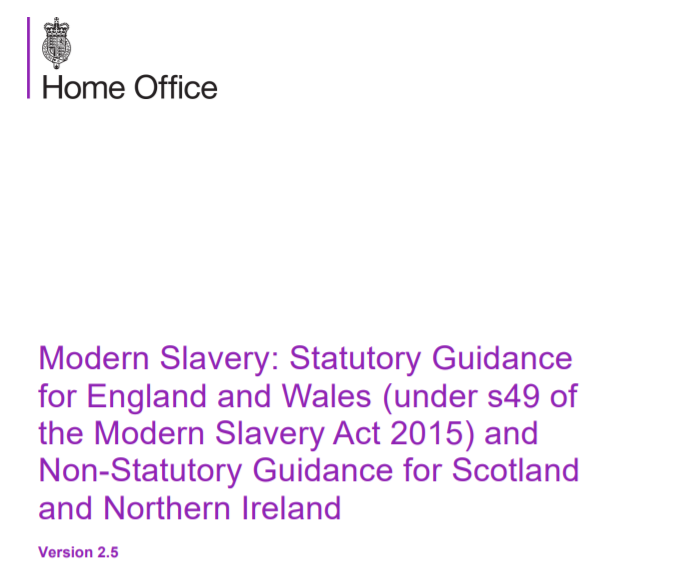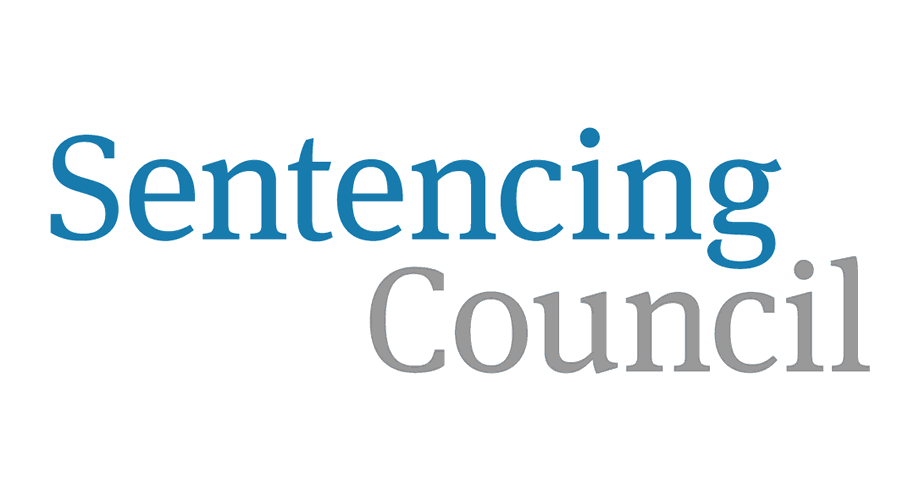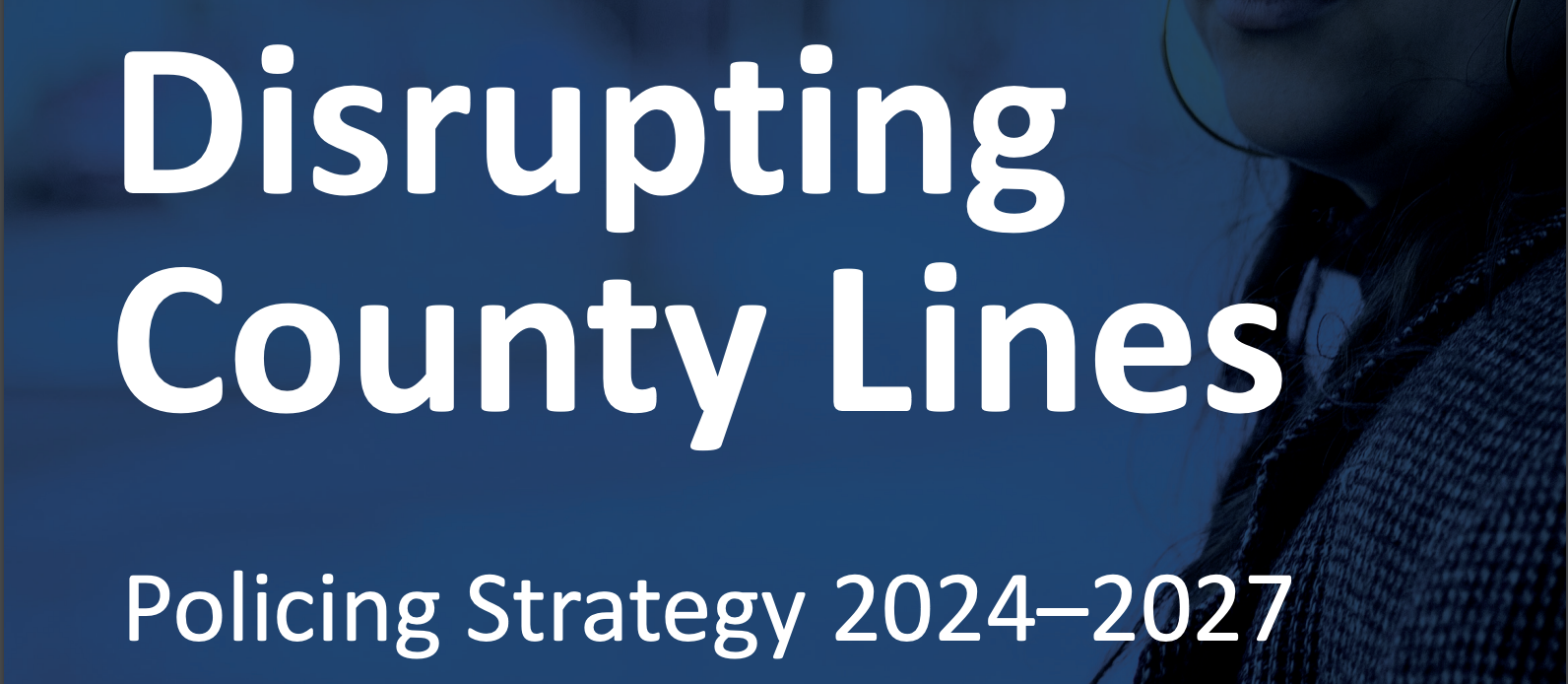
The strategy report Disrupting County Lines: Policing Strategy 2024-2027 has been released by the National Police Chief Counsel (‘NPCC’), with the National County Lines Co-Ordination Centre (‘NCLCC’). Modern slavery and human trafficking within the UK often occurs across County Lines related to illicit drug trade, which means a coordinated response is required by police forces and first responders to identify victims of exploitation. Individuals recruited to sell drugs are often vulnerable adults or minors, who need to be identified as victims of criminality and reported to the National Referral Mechanism (NRM). Most children involved in County Lines are between 15-17, however some are younger. The strategy pulls on recent statistics from the NRM whereby 11% of referrals were involved with County Lines. The strategy to disrupt County Lines was initiated in 2019, since which 5,000 drug lines have been closed. Furthermore, the strategy aims to:
- Prevent people engaging in County Lines, and the associated violence and exploitation.
- Proactively safeguard children and vulnerable adults from harm.
- Better prepare communities by building resilience against the harms of County Lines.
- Relentlessly pursue offenders, including Organised Criminal Groups, Urban Street Gangs and individuals running County Lines.
See here for the full report Disrupting County Lines: Policing Strategy 2024-2027.
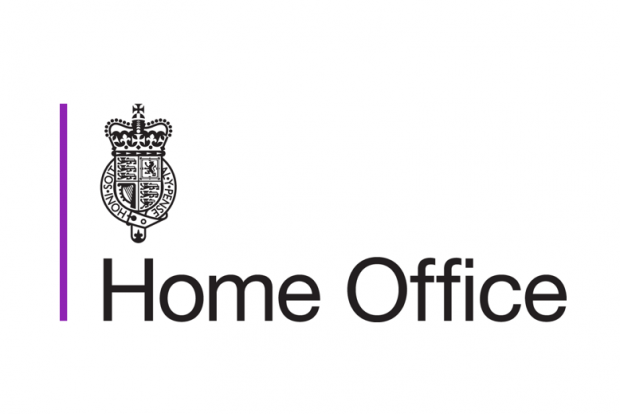
Statistics for the National Referral Mechanism in the UK, for first quarter in 2024 (January to March) includes a summary and breakdown of the number of potential victims of modern slavery referred into the (NRM) or via the Duty to Notify (DtN) process.
Key Results:
- 4,524 potential victims of modern slavery were referred to the Home Office from January to March 2024, representing a 9% increase compared to the period from October to December 2023 (4,134) and a 5% decrease compared to the period from January to March 2023 (4,738)
- 73% (3,291) of potential victims were male and 27% (1,226) were female; this is the highest quarterly number of referrals for females since the NRM began
- 80% (3,628) of referrals were sent to the Single Competent Authority (SCA) for consideration and 20% (896) to the Immigration Enforcement Competent Authority (IECA)
- the most common nationalities referred this quarter were UK (24%; 1,105), Albanian (17%; 791) and Vietnamese (11%; 493)
- 5,161 reasonable grounds and 3,893 conclusive grounds decisions were issued this quarter; of these, 55% of reasonable grounds and 48% of conclusive grounds decisions were positive
- the number of reasonable grounds decisions and conclusive grounds decisions issued by the competent authorities were both at their highest for a quarter since the NRM began
- the Home Office received 1,125 reports of adult potential victims via the DtN process
See the full Home Office Report here.
The National Referral Mechanism (NRM) is the United Kingdom’s system that identifies potential victims of modern slavery. Annual statistics for 2023, as well as the 4th quarter October – December 2023 have been released in March 2024. The increases in referrals to the NRM are likely due to increased awareness of modern slavery, as well as potential increases in exploitation. Major findings detail:
4th Quarter, October – December 2023
- 4,142 potential victims of modern slavery were referred to the Home Office, a similar number to the previous quarter (4,131) and a 6% decrease from the same quarter in 2022 (4,413).
- The most common nationality referred in the quarter were UK nationals (27%; 1,139). Albanian nationals were the second most commonly referred with 802 referrals (19%), with Vietnamese nationals third with 268 referrals (6%).
- Of the 4,142 potential victims referred, 48% (1978) were potential victims who claimed to have been exploited when they were adults, whilst 47% (1,945) claimed to have been exploited when they were children. Of these, 75% (3,097) were male and 25% (1,041) were female.
- Regarding the type of exploitation most commonly seen amongst referrals, the highest proportion of referrals were for criminal exploitation only (28%; 1,172). For adult potential victims, labour exploitation was most commonly reported (34%; 680), whereas child potential victims were more commonly referred for criminal exploitation (43%; 844). Though referrals flagged as county lines partly drove the increase in referrals for children within the criminal exploitation category between 2020 to 2022 (average of over 550 referrals each quarter), in 2023, the number of referrals flagged fell to an average of around 390 each quarter.
Overall in 2023, 15,247 reasonable grounds and 9,825 conclusive grounds decision were made. Of these, 55% of RG decisions and 66% of CG decisions were positive. The number of CG decisions was the highest annual number made since the NRM began.
The full Home office report can be found here, Modern Slavery: National Referral Mechanism and Duty to Notify statistics UK, quarter 4 2023 – October to December.
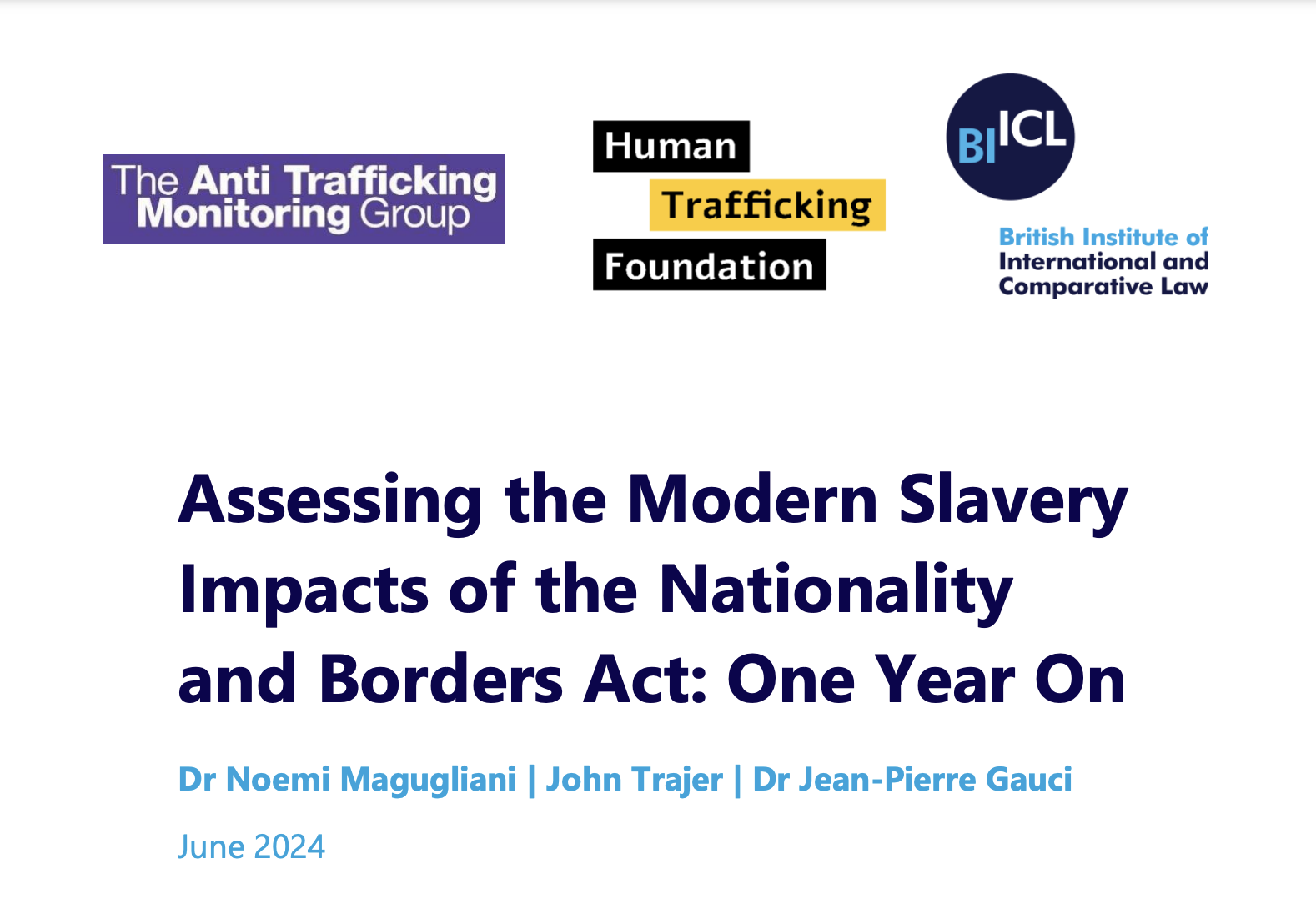
This month, British Institute of International and Comparative Law, with Human Trafficking Foundation and the Anti-Trafficking Monitoring Group released a report to assess the impact of the UK Nationality and Borders Act. After passing in April 2022, the provisions relating to modern slavery came into effect in January 2023. The report examines impacts over the last year on decision making outcomes, people with lived experience of modern slavery, and on organisations in the modern slavery sector.
As detailed further in this report, the Nationality and Borders Act made critical changes to processes addressing Modern Slavery in the UK, including:
- new definitions of ‘victims’ of modern slavery and human trafficking
- changes to the definition of the ‘reasonable grounds’ decision within the National Referral Mechanism
- the introduction of a procedure to exclude modern slavery protections on grounds of public order and bad faith
See here for or the full report Assessing the Modern Slavery Impacts of the Nationality and Borders Act: One Year On.
Earlier in November 2021, UK’s Home Office published new statutory guidance on identifying and supporting modern slavery victims. Aimed at competent authority staff in England and Wales, the guidance explores what amounts to slavery, human trafficking and exploitation.
The guidance emphasis that human smuggling is not human trafficking and explains the differences between them, as well as, providing a list of myths about modern slavery and dispelling them.
The guidance also emphasises that competent authority staff, while not First Responders, should be aware of the indicators of modern slavery. It further explains system of identifying victims, lists the non-public authorities that are First Responders and further lists non-First Responder Organisations involved in tacking modern slaver and human trafficking.
The guidance then focuses on the process of referring potential victims, working with vulnerable people and the NRM decision making process. Lastly, it explores the support for adult and child victims.
Please see the government website for the full guidance.
Following a consultation, the Sentencing Council has published new sentencing guidelines for offences under the Modern Slavery Act 2015.
The new guidelines will come into effect on 1st October 2021 and will be used by magistrates and judges when sentencing offenders for offences under sections 1, 2, 4 and 30 of the Modern Slavery Act 2015. This means the offences covered by the sentencing guidelines include: slavery, servitude, forced or compulsory labour; human trafficking; committing an offence with intent to commit human trafficking; and breach of a slavery and trafficking prevention order or a slavery and trafficking risk order.
The sentencing guidelines aim to promote consistency in approach in sentencing for modern slavery offences. Under the new guidelines, offenders could face up to 18 years in prison.
For the Sentencing Council’s announcement and guidelines please see here.
The UK Home Office has published the most recent Modern Slavery Statistics, covering quarter 3 of 2020 (July – September).
Home Office reports that 2,506 potential victims of modern slavery were referred to the NRM. 1,224 (29%) of the NRM referrals claimed exploitation as adults whilst 1,159 (46%) claimed exploitation as children. For 5% of the referral their age at exploitation was unknown.
Overall, of the 2,506 potential victims referred in this quarter, 74% (1,853) were male and 26% (647) were female; these proportions are similar to the previous quarter. For adult potential victims, 69% (849) were male and 31% (374) were female, whilst for child potential victims, 79% (912) were male and 21% (242) were female.
The statistics flag the issue of ‘county lines’ exploitation of children – with 401 referrals flagged as county lines referrals, accounting for 16% of all referrals received in the quarter. The majority (82%; 328) of these referrals were made for male children.
UK, Albanian and Vietnamese citizens remain the most common nationalities referred to the NRM.
For detailed statistics please see the government website here.
The National Referral Mechanism (NRM) is the UK framework for identifying and referring potential victims of modern slavery and ensuring they receive the appropriate support. This statistical bulletin gives a summary and breakdown of the number of potential victims of modern slavery referred into the National Referral Mechanism from 1 January to 31 March 2020 (quarter 1).
Follow this link for the NRM Statistics UK, Quarter 1 2020 – January to March.
A report released last year by the Freedom Fund and John Jay College gives some of the first reliable estimates in relation to how many children are involved in the adult entertainment industry in Kathmandu. It has always been known that a significant number of young people and children work in the adult entertainment industry in Kathmandu, but until recently no reliable estimates existed as to the true scale of the problem.
The study found that approximately 1650 young people under the age of 17 are working in the adult entertainment industry, making up approximately 17% of those working in the industry. The study also found 62% of workers were working in the industry before the age of 18. The majority of underage workers in the adult entertainment industry were found to be working in sexually exploitative environments and 99% were considered to be held in the worst forms of child slavery as defined by the International Labour Organisation’s convention.
The full study can be found
here.



